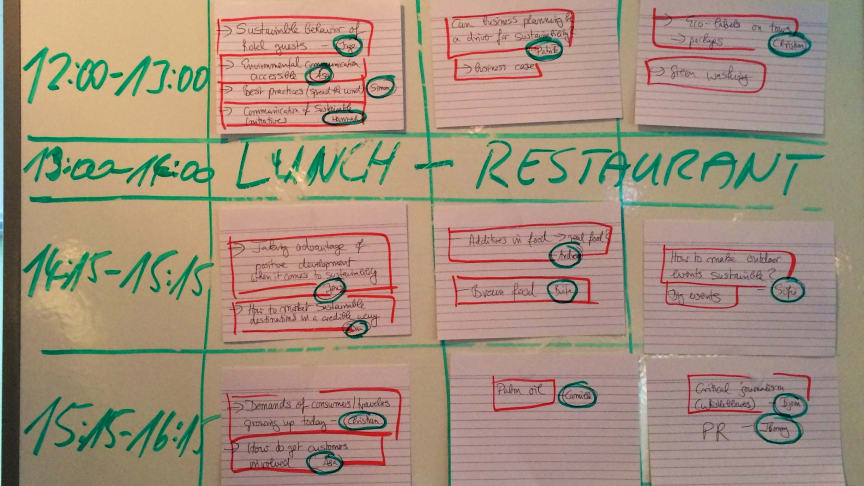Green Tourism Camp in Sigtuna calls for more leaders to join the debate on sustainability

Sustainability issues must be included in the visions, strategies and business plans we use to develop our destinations. Only then can the tourism industry make a difference. Participants in the event Green Tourism Camp call for greater commitment and challenge the industry leaders and decision makers to participate in the call towards a more sustainable tourism development – for the benefit of a growing industry.
For the second year in a
row, the "unconference" Green Tourism Camp Scandinavia was held in Sigtuna
on the subject of Tourism and Sustainable Development. During two full days, more
than 30 participants shared their questions, experiences and knowledge.
Participants joined from England, Belgium, Austria and Germany, and from Sweden,
Skåne, Gotland, Uppsala, Gothenburg, Stockholm and Swedish Lapland were
represented.
On the agenda – created entirely by the participants – were nearly 20 different workshops that were all, in some way, based upon the conventional definition of sustainability (environmental, economic and social). Workshops raised topics like: What is bad tourism? How do we measure sustainability? What is a green meeting? How can we engage our hotel guests to become more involved? How to communicate sustainability efforts? How to implement sustainability as a strategic tool in the business plan? What’s the attitude of the younger generations pertaining to tourism and sustainability? And how can we use collaboration as an effective tool for ensuring sustainable development?
In a final session, the participants concluded that the decision makers within the travel and hospitality industry need more knowledge regarding sustainability issues, both at international and national level as well as at the local destinations.
With a growing industry comes an increased responsibility for mitigating climate change and environmental impact, but also a great opportunity to strengthen the common power of attraction. It is a responsibility that all must take on, and Sweden has the chance to take the lead in sustainable tourism. This is a chance that we cannot afford to miss. Sustainability must therefore not become a parallel niche issue, but instead be treated as an integral part of business development and daily operations.
Since destination development in Sweden is mainly financed by public funds, the governmental agencies must be involved in the development of new visions and strategies to a large extent. Sustainable development requires the exchange of knowledge, best-practice sharing, active participation and a desire to make a change. With commitment, curiosity and openness, a positive paradigm shift can take place, for the benefit of Swedish tourism as a whole.
Participants in the Green Tourism Camp are now challenging the industry's leaders and decision makers to deepen their knowledge and invite them to an active participation at the GTC in Sigtuna 2015.
Anders Esselin, Man & Nature
Andreas Olsen, Hotell Kristina
Björn Arvidsson, RazorMind
Brita Moosemann, Yield for profit
Camilla Zedendahl, Destination Sigtuna
Catarina Wallentin, Gotland Convention Bureau
Christian von Essen, Travel Report and CityXpress
Christine Fuchs, the Social Fox
Cinzia Paulsen, Konferens & Event, SF Bio AB
Dan Jonasson, Sustainability expert Kiruna in Swedish Lapland
Dennis Zalamans, Södertörns Högskola
Gustaf Onn, Södertörns Högskola
Hanna Bergendahl, Sigtuna Meetings
Henrik von Arnold, Stockholm Convention Bureau
Inge Huijbrechts, Carlson Rezidor Hotel Group
Jan Peter Bergkvist, Sleep Well
Jens Johansson, U&We
Jeppe Klockaresson, Fair Travel
Jonas Norén, SF Bio AB
Katarina Torstenson, Göteborg & Co.
Kym McWhinnie, Royal Collage of Physicians
Lotta Boman, Sigtuna Meetings
Louise Gustafsson, Carlson Rezidor Hotel Group
Maria Tullberg, Radisson Blu Arlandia Hotel och Radisson Blu SkyCity Hotel
Marie Häggström, Stockholm Convention Bureau
Patrik Dyrendahl, SF Bio AB och GMIC Sweden
Simon Strandvik, Greentime AB
Sofie Blomgren, Destination Uppsala
Sofie Broomé, Event in Skåne
Wolf-Thomas Karl, Agentur Karl & Karl
Ywonne Glimeld, student Hållbar Turism, Akademi Båstad
Åsa Markén, Swedavia Swedish Airports
Facts
A BarCamp is an “unconference” where neither speaker, program events nor seminars are predetermined. Instead, it is the commitment of the participants that shape the content. Everyone participates equally in conversations and discussions and generously share their knowledge and experience. The agenda is decided on the spot based on common issues.
Green Tourism Camp Scandinavia in 2014 was organized by Destination Sigtuna AB together with Yield for Profit, Karl & Karl, supported by GMIC Sweden, and took place at the Hotel Kristina in Sigtuna. For more information, a summary of the discussions and the list of participants, see the website www.green-tourism-camp.com
For more information please contact Camilla Zedendahl, Destination Sigtuna, mobile: +46 709906 973, e-mail: Camilla.zedendahl@destinationsigtuna.se
Om Destination Sigtuna
Destination Sigtunas uppdrag är att marknadsföra och utveckla besöksnäringen i Sigtuna för att locka fler besökare till destinationen och därmed stärka dess attraktionskraft. Sigtuna är Sverige fjärde största hotelldestination räknat i antalet gästnätter och destinationen omfattar Arlanda, Märsta, Rosersberg, och Sigtuna stad. Besöksnäringen i Sigtuna är en viktig basnäring och 2019 låg omsättningen på 43,6 miljarder kronor. Destination Sigtuna företräder destinationens besöksnäring och marknadsför Sigtuna som ett attraktivt besöksmål 365 dagar om året och driver utvecklingsfrågor i samverkan med kommunen och näringslivet. Bolaget bildades 1992 och ägs till 47 procent av Sigtuna kommun och till 53 procent av lokala privata företagare. Bolaget driver bland annat Sveriges första hållbarhetsnätverk för hotell- och mötesanläggningar, ett hotellnätverk och Frukostklubben. Destination Sigtuna projektleder även evenemangen Sigtuna Litteraturfestival, Sigtuna Julmarknad och Sigtuna Möte. För mer information, besök www.destinationsigtuna.se